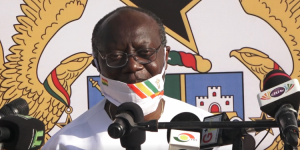Micro, Small and Medium Enterprises operators have been urged to be innovative and strive to manufacture quality products to remain competitive.
The Deputy Minister of Trade and Industry, Nana Ama Dokua Asiamah Adjei, who made the call, said there was always room for innovation, improved performance and opportunities for increased productivity no matter how well a business was run.
“The availability and access to Business Development Service Providers (public and private) is essential for MSMEs to learn and acquire new skills regarding marketing, operations, financial management, resourcing, technology and innovation.”
Nana Ama Dokua was speaking at the maiden meeting of the Joint Coordinating Committee (JCC) of the Enterprise Development Project with Kaizen.
The five-year project is being implemented by JICA and GEA with a core focus of providing technical support, developing and implementing a Business Development Service Model, partnering with Financial Institutions to improve access to finance for MSMEs, and enhancing the quality of start-up support.
The current project follows the successful implementation of the Kaizen Project by NBSSI now GEA and JICA in Ashanti and Greater-Accra Regions.
The Kaizen Project made a huge impact on beneficiary enterprises in these regions, as MSMEs experienced an increase in the quality of their products, increased turnover as well as productivity of their employees.
“My Ministry is still in support and therefore keeping an eye on the GEA’s intention to replicate KAIZEN methodology in five more regions in the country namely Eastern, Western, Volta, Upper East and West.”
The Deputy Minister expressed hope that the launch and implementation of the Enterprise Development Project with Kaizen (EDPK) would have a significant and positive impact on the MSME eco-system.
The Project also sits well with the ongoing restructuring of Ghana Enterprises Agency (GEA) operations and their new strategy of adopting, modernizing and transforming the quality and mix of its BDS interventions.
She expressed the hope that the Project would eventually move to cover all the sixteen (16) regions in the very near future.
She appealed to the committee members to diligently provide the needed leadership and direction in shaping the proper implementation of the Project, which is very much needed to support the industrialization agenda of this government.
On her part, Mrs Kosi Yankey-Ayeh said the second phase of National Kaizen Project, which ended in 2018 saw over Fifty one 51staff trained and over 450 enterprises and an average of 4,500 workers in those enterprises benefit from the Kaizen Project.
She said the current project, the Enterprise Development Project with Kaizen (EDPK), was borne out of the commitment of JICA and MOTI, to strengthen and enhance the business development services to MSMEs.
She said the Project aimed at not only enhancing GEA’s capacity to providing BDS to MSMEs but improving and building upon the quality of business development services to MSMEs in the country.
To achieve its aim of strengthening the enterprise development eco-system in Ghana, the EDPK which is a five-year Project is made up of three Outputs.
The first output focuses on developing and implementing a Business Development Service (BDS) provision model under which a database for BDS Providers would be developed with the aim of registering at least 500 BDSPs.
“It is our expectation that the database will have an evaluation and certification system of BDSPs. This will ensure that we provide our MSMEs with a certain standard of business development support.”
In addition, our Business Advisors, in the Greater Accra and Ashanti Regions will receive practical On-the-Job business development training particularly in the areas of financial management, marketing, and business planning.
The Project will also support the move at putting in place a system to help at monetizing our Kaizen knowledge by establishing a fee-based Kaizen service and building the capacity of the GEA Kaizen trainers.
The second Output of the Project seeks to address the ongoing challenges that many MSMEs face when considering access to finance.
We are looking at building the capacity of 350 MSMEs to enable them to apply for commercial loans, thereby bridging the gap to access to finance.
We certainly have our work cut out for us, but I have every confidence that by the end of the Project, we would have success stories to share.
Lastly, Output 3 focuses on enhancing the quality of start-up support, through business incubation and acceleration programs.
GEA together with other partners like the Accra Digital Centre will be playing their respective roles to ensure startups receive the necessary government, regulatory, and business support.
“To ensure the successful implementation of the EDPK, today we seek your input as JCC members and your consensus on the Project Work Plan and Design Matrix that we will share with you.”
Mr Araki Yasumichi, Chief Representative of JICA Ghana, said JICA had been working together with government and partner agencies to encourage the private sector since the first project for MSMEs in 2005.
He said despite the pandemic and initial difficulties, the project had implemented designed
activities towards the three outputs of financial management and marketing training for Business Advisory Centres in Ashanti and Greater.
Accra, the implementation of the partnership model with financial institutions to improve access to finance for enterprises and support to start-ups through the NINJA business competition and the recently launched NINJA Lean Programme.







